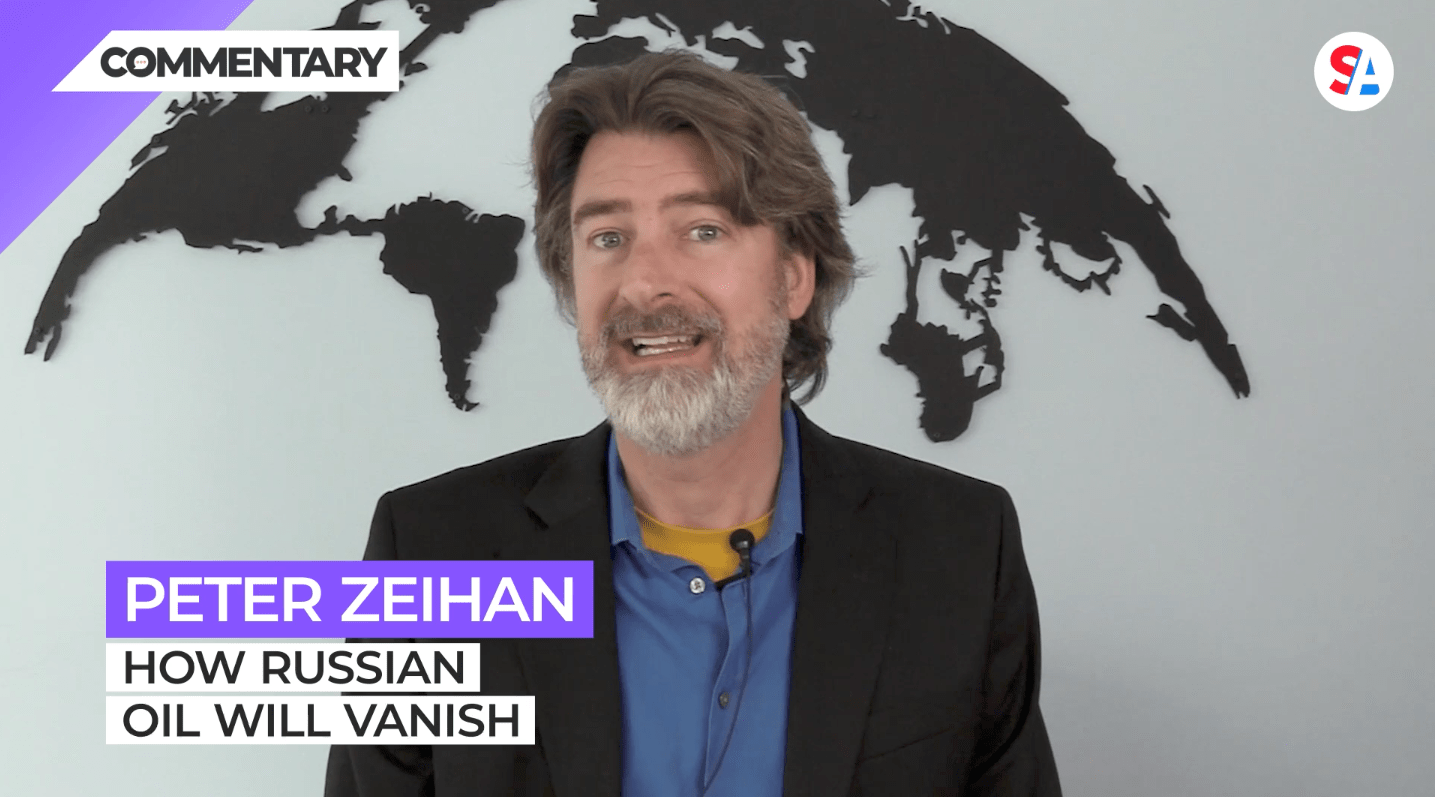
Commentary
-
Our commentary partners will help you reach your own conclusions on complex topics.
Hey, everyone. Peter Zeihan here coming to you from Colorado. The news on March 21 was all about how the Europeans are starting to seriously discuss the concept of a full ban on all Russian oil, natural gas, and refined product exports.
Now, this is still in progress. It’s probably not gonna happen this week because it requires a lot of countries that have been very hostile to the idea over the years of agreeing to go with it. But it’s time to start talking about what that looks like because it probably is inevitable, and it’ll almost certainly happen in April.
So first a little bit of background about how the Russian system works. When the Soviet Union broke up, they had a lot of big fields that were being tapped, not necessarily to generate the most money, but just because the Soviet system didn’t value efficiency.
We’ve heard that for, from time to time.
Anyway, everything went west. There were a series of pipelines that started in northwest Siberia, traced, southwest and west to eventually getting to three specific locations.
The first one is a major pipeline that goes through major pipeline system, which goes through Belarus and Ukraine and into Poland. And then on to Germany.
The second one is a pipe that terminates near St. Petersburg that finally came online in the post Cold War era at a place called Primorsk. So it’s on the Baltic Sea.
And the third one goes to a preexisting super port Novorossiysk, which is on the Black Sea.
So two Russian ports, one pipeline system. These are the ones that are to a degree interconnected because these pipeline networks trace not just through Siberia or Europe, but all the lands in between.
So this is what the Russians also use for their own internal distribution.
And during the Soviet times, that’s what they used for distribution into Belarus and Ukraine as well.
All of these are gonna get shut down. The ones, the pipes going to Poland and Germany, probably the first ones to go down because they’re either gonna be damaged in the war or Ukrainian partisans, are going to target a source of income. So that that’s gonna go away.
Novorossiysk on the Black Sea is a shallow water port. It can only take small shuttle tankers and anything that goes out then needs to go through the Turkish straits as well.
Well, the Turks have declared Russia, a belligerent because it is, and there’s a war on. And so insurance companies have been pulling insurance policies for any ships that try to go to Novorossiysk.
So the only ships that can go are those that can get a sovereign indemnification from another country.
So there are signs that the Chinese are trying to send a fleet of small tankers into this port in order to load them up. And then once they get through the Turkish Straits at sea, offload them from the small tankers to a super tanker, then can then make the transcontinental trip to China.
Up north on the Baltic Sea, in Primorsk, there’s not an insurance issue there. It’s a captain’s issue. Captains are refusing to dock at a Russian port, and then there are dock workers in Europe that are refusing to unload the cargo. So again, the Chinese are looking at potentially going there as well.
Now all of this is getting shut down because the Europeans, once they do a full sanctions package, so obviously the pipes they can shut off themselves.
But the EU working with NATO can shut down both the Danish straits and the Turkish straits and that blocks it. All, nothing can get in and out. The Turks may still be getting a little bit of oil from the Russians on the side. That might be the price of getting this deal in, but it is coming and that is four to five million barrels a day that’ll fall offline.
Now some people say, why don’t you just send it to China? I mean the Chinese, they’re not price sensitive. They’ll do anything. Well, there there’s an infrastructure issue.
First of all, what the Chinese are trying now is to load up at Primorsk and Novorossiysk and then within sight of NATO ports transfer this cargo from a small ship to a large ship. And just to assume that no one’s going to do anything about it. It’s one of the dumber things that I’ve heard, but apparently the Chinese are gonna try it.
Because right now Russian Euros blend is trading at a $30 discount to other global trades. So they’re thinking that it’s worth the risk.
And if they do get slapped down, it’s no big, no big loss.
The real problem is that those fields in northwest Siberia, all the pipeline, all the infrastructure goes to the west.
The fields that supply the Asian routes are not connected. So you’ve got a couple big ones. There’s some in the Ekusk area which supplies a pipeline that’s known as Espo, E S P O, which terminates near Vladivostok on the Pacific. And there’s a little spur line that goes down from that into Daking in northern China proper. And then you’ve got a Sakhalin project, which is this far eastern island, north of Japan, used to be Japanese territory before World War II, where there’s a couple of projects that send natural gas by pipe or by LNG to the wider world.
Now the problem that the Chinese and everyone are gonna have with these projects is that the Russians can’t operate any of them themselves.
These are all post Cold War developments. Companies like Shell and Exxon are on the Sakhalin projects, and services firms like Schlumberger and Halliburton are the only ones who, who can do the operations on shore that supply the Espo line. Well over the course of the war, they’ve all pulled out. In fact, Halliburton and Schlumberger just announced their withdrawal on March 18 and March 19. Whereas Exxon was one of the first out the door. So the Russians can’t keep this stuff going.
And linking the western infrastructure to the eastern infrastructure would require a series of pipelines that are longer in the distance from Anchorage, Alaska to Miami through largely virgin terrain.
That’s a 10-year project. That’s a $50 billion project minimum, assuming nothing else goes wrong.
So not only are we looking at a collapse in Russia’s ability to send crude west, we’re looking at a slower collapse in Russia’s ability to send its preexisting flows south to China, that’s going to weaken over time and don’t think that the Chinese can come in and take care of this for the Russians because the Chinese are even worse at oil tech than the Russians are.
So the outcome of this war so far is condemning the Chinese to get less product out of Russia as opposed to more product. Fun times. Okay. That’s it from me today until next time.
-
Hurricane Helene hits US coast, Appalachia and beyond
Hurricane Helene hit Florida and Georgia overnight between Sept. 26 and 27 as a Category 4 hurricane, and accompanying storms will continue reaching deeper into the continental United States today. Dangerous flash flooding from the hurricane, known as storm surge, was some of the worst flooding that the Tampa Bay area has ever seen, and… -
Israel holds upper hand against Lebanon, Hezbollah and Iran
On Wednesday, Sept. 25, Hezbollah launched a ballistic missile at Tel Aviv in retaliation for Israel’s explosive pager attack that blew up devices across Lebanon. Although Israel’s defense systems intercepted the surface-to-surface missile, the attempted strike on Tel Aviv marked a significant escalation by Hezbollah. Since the siege on Gaza began, shortly after the Oct. 7, 2023,… -
The Sinaloa Cartel civil war
Fears of a civil war within the Sinaloa Cartel are growing as violence between competing factions within the cartel continues. The Mexican Army has dispatched around 600 elite troops to Sinaloa to help quell those fears, in addition to roughly 2,200 regular soldiers and National Guard. Watch the above video as Straight Arrow News contributor… -
New Ukrainian weapons hit Russia where it hurts
Ukrainian drones struck a major Russian ammunition depot, triggering a massive explosion that was captured on camera. According to the Ukrainian military, 2,000 tons of munitions had arrived at the depot before the attack. Over the past two years, Ukraine has significantly increased its domestic drone production, allowing it to scale up attacks on military… -
Weighing social costs vs. economic benefits on immigration
Global human migration is one of the defining elements of our current historical era, according to the United Nations. Migrants face both the incentives to leave — forced out by climate change, crime and corruption, extreme poverty or violence — and incentives for where to go, based on available job opportunities and so on. Migration…
Latest Stories
-
 Getty Images
Getty Images
NCAA to be investigated by West Virginia after WVU left out of tournament
-
 Reuters
Reuters
Could China’s new amphibious barges impact Taiwan’s defense?
-
 Getty Images
Getty Images
Can Pepsi’s poppi purchase help it go younger as Americans drink less soda?
-
 Getty Images
Getty Images
Trump to shut down Voice of America, cites ‘radical propaganda’
-
 Getty Images
Getty Images
US warship deployed amid efforts to protect southern border
Popular Opinions
-
In addition to the facts, we believe it’s vital to hear perspectives from all sides of the political spectrum.
Latest Opinions
In addition to the facts, we believe it’s vital to hear perspectives from all sides of the political spectrum. We hope these different voices will help you reach your own conclusions.
The opinions published in this section are solely those of the contributors and do not reflect the views of Straight Arrow News.





















Latest Commentary
We know it is important to hear from a diverse range of observers on the complex topics we face and believe our commentary partners will help you reach your own conclusions.
The commentaries published in this section are solely those of the contributors and do not reflect the views of Straight Arrow News.
Dr. Frank Luntz
Pollster and Political Analyst‘Division’: Americans react to Trump address to Congress
‘Overblown’: Americans debate the merits of DEI policies
‘Biased’: What Americans think of ‘mainstream media’